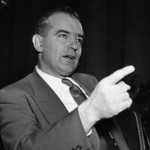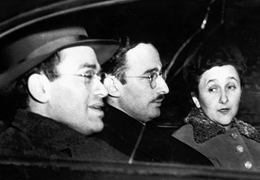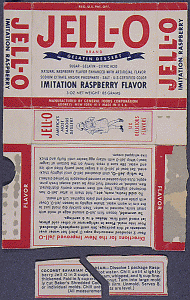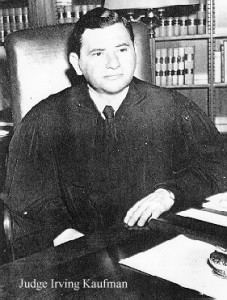In From Colony to Superpower, George Herring describes the early stages of the Cold War as a turbulent time in United States (US) history. During this period, the government created policies, like containment, that would influence American foreign policy until the fall of the Soviet Union in 1991, and American citizens began to determine their views on the threat of Communism within US borders (Herring 635-637). In September 1949 after the Soviet Union successfully exploded an atomic bomb, the consequences of Soviet espionage within the United States became very real to many Americans. With these events in the background, Senator Joseph R. McCarthy emerged as a leader among American politicians who were adamant about rounding up alleged Communists within the United States and reducing the threat to the country. To accomplish this, McCarthy and his allies fomented and exploited the fear of Communism to promote their cause. Herring summarizes this point in time by writing, “A Cold War culture of near hysterical fear, paranoiac suspiciousness, and stifling conformity began to take shape. Militant anti-communism increasingly poisoned the political atmosphere at home…”(Herring 637). Herring’s quote highlights the power of political ideologies in the bipolar world and shows the fear and contempt many Americans felt about Communism.
In this climate, the case of alleged atomic spies, Julius and Ethel Rosenberg, took center stage as an example of the threat Communists posed on American soil. The Rosenberg trial provides a clear example of how the “near hysterical fear” of Communism motivated the prosecutors in the case and a large part of the American public to violate standards of legal and clear evidence in order to convict and execute the Rosenberg’s. As members of the Communist Party, both Julius and Ethel were active politically in the years prior to their arrests in 1950. In Heir to an Execution: A Granddaughter’s Story the codefendant in the Rosenberg case, Morton Sobell, describes Julius and Ethel as very politically active. Sobell goes on to explain how Julius, himself, and their friends all believed that a Socialist world would be a better world and that the Soviet Union was the answer to bringing Socialism to America. The Rosenberg’s political activity combined with Julius’ post at the War Department during WWII made him and his wife perfect suspects for the crime of passing atomic secrets to the Soviets.
Arrested on July 17, 1950, Julius Rosenberg was initially accused of passing atomic secrets to the Soviets and his wife Ethel was arrested as a co-conspirator on August 11, 1950. Although both Julius and Ethel maintained their innocence throughout their trial, conviction, and up to the point of their execution, the two were in fact guilty of espionage. What makes this case interesting is that although the Rosenberg’s were guilty, the way in which they were convicted and the evidence used against them reflects the fear that Herring describes as infecting the country in the early Cold War years. For example, Ivy Meeropol describes in her documentary, Heir to an Execution that one of the pieces of evidence used against her grandparents, the Rosenberg’s, was a can found in their New York apartment with the label, “Save A Spanish Republican Child”. The investigators in the case used this can to prove the Rosenberg’s connection to the Soviet Union. Another piece of evidence used against the Rosenberg’s was a Jell-O box described by another Soviet spy, Ethel’s brother, David Greenglass, as a way for the spies to confirm their identities when they passed along information meant for the Soviet Union. A third piece of evidence, sited by Greenglass as a tool the Rosenberg’s used for espionage activities, was a small console in the family’s living room. During the trial, the prosecutors questioned Julius and Ethel about the table, but the two maintained they bought it at Macy’s. In the prosecution’s summation, prosecutor Irving Saypol suggested that the console was used for “microfilming” and therefore was a crucial part of the Rosenberg’s espionage activities. Following the trial, the console was determined to be void of any hidden cameras, and just a normal table from Macy’s.
All three of these pieces of evidence were used to connect the Rosenberg’s to the Soviet Union and accuse them as spies. However, the determination of the prosecution’s crucial piece of evidence, the console, as irrelevant to the Rosenberg’s espionage activities calls into question the entire collection of evidence. From this example, we can see a snapshot of how fear of Communism in the United States degraded the quality of evidence and overall integrity of the trial. In conclusion, Judge Irving Kaufman’s sentencing statement, which concluded the Rosenberg trial, encapsulates America’s fear of Communism. In the statement, Kaufman says, “I consider your crime worse than murder. Plain deliberate contemplated murder is dwarfed in magnitude by comparison with the crime you have committed. In committing the act of murder, the criminal kills only his victim…I believe your conduct in putting into the hands of the Russians the A-bomb years before our best scientists predicted Russia would perfect the bomb has already caused, in my opinion, the Communist aggression in Korea, with the resultant casualties exceeding 50,000 and who knows but that millions more of innocent people may pay the price of your treason. Indeed, by your betrayal you undoubtedly have altered the course of history to the disadvantage of our country.” Kaufman’s quote which condemned Julius and Ethel Rosenberg to death emphasizes how frightening the idea of the Soviet’s having nuclear weapons and the Communist ideology both were for Americans in the early Cold War years.





Matthew Pinsker
Received, thanks